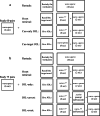The effect of delayed judgments of learning on retention
- PMID: 33679269
- PMCID: PMC7912969
- DOI: 10.1007/s11409-021-09260-0
The effect of delayed judgments of learning on retention
Abstract
Evidence is mixed concerning whether delayed judgments of learning (JOLs) enhance learning and if so, whether their benefit is similar to retrieval practice. One potential explanation for the mixed findings is the truncated search hypothesis, which states that not all delayed JOLs lead to a full-blown covert retrieval attempt. In three paired-associate learning experiments, we examined the effect of delayed JOLs on later recall by comparing them to conditions of restudy, overt retrieval, and various other delayed JOL conditions. In Experiment 1, after an initial study phase, subjects either restudied word pairs, practiced overt retrieval, or made cue-only or cue-target delayed JOLs. In Experiments 2a and 2b, where conditions were manipulated within-subjects, subjects either restudied word pairs, practiced overt retrieval, made cue-only delayed JOLs, made cue-only delayed JOLs followed by a yes/no retrieval question or, in another condition, by an overt retrieval prompt. The final cued recall tests were delayed by two days. In Experiment 1, recall after cue-only delayed JOLs did not reliably differ from recall after overt retrieval or restudy. In Experiments 2a and 2b, delayed JOLs consistently produced poorer recall relative to overt retrieval. Furthermore, reaction times for delayed JOLs were shorter relative to delayed JOLs paired with overt retrieval prompts. We conclude that only some delayed JOLs elicit covert retrieval attempts, a pattern supporting the truncated search hypothesis.
Supplementary information: The online version contains supplementary material available at 10.1007/s11409-021-09260-0.
Keywords: Covert retrieval; Delayed judgments of learning; Reactivity; Truncated search.
© The Author(s), under exclusive licence to Springer Science+Business Media, LLC part of Springer Nature 2021.
Conflict of interest statement
Conflict of interest/competing interestsThe authors have no competing interests with respect to their authorship or the publication of this article.
Figures



Similar articles
-
A Review of Judgments of Learning and Executive Functions in Spaced Learning: The Enemy of Spacing?Cureus. 2025 Jan 10;17(1):e77230. doi: 10.7759/cureus.77230. eCollection 2025 Jan. Cureus. 2025. PMID: 39925536 Free PMC article. Review.
-
When people's judgments of learning (JOLs) are extremely accurate at predicting subsequent recall: the "Displaced-JOL effect".Memory. 2018 Jul;26(6):771-783. doi: 10.1080/09658211.2017.1406523. Epub 2017 Nov 29. Memory. 2018. PMID: 29187067
-
Reactivity from judgments of learning is not only due to memory forecasting: evidence from associative memory and frequency judgments.Metacogn Learn. 2022;17(2):589-625. doi: 10.1007/s11409-022-09301-2. Epub 2022 Apr 29. Metacogn Learn. 2022. PMID: 35505852 Free PMC article.
-
Delayed Metacomprehension Judgments Do Not Directly Improve Learning from Texts.J Intell. 2023 Jul 24;11(7):150. doi: 10.3390/jintelligence11070150. J Intell. 2023. PMID: 37504793 Free PMC article.
-
Judgments of learning reactively affect memory by inducing covert retrieval.J Gen Psychol. 2025 Jul-Sep;152(3):497-525. doi: 10.1080/00221309.2024.2409785. Epub 2024 Sep 28. J Gen Psychol. 2025. PMID: 39340430
Cited by
-
Elucidating the underlying components of metacognitive systematic bias in the human dorsolateral prefrontal cortex and inferior parietal cortex.Sci Rep. 2024 May 18;14(1):11380. doi: 10.1038/s41598-024-62343-1. Sci Rep. 2024. PMID: 38762635 Free PMC article.
-
The Forward Effect of Delayed Judgments of Learning Is Influenced by Difficulty in Memory and Category Learning.J Intell. 2023 May 25;11(6):101. doi: 10.3390/jintelligence11060101. J Intell. 2023. PMID: 37367503 Free PMC article.
-
The difference between metacognition and mindreading: Evidence from functional near-infrared spectroscopy.Front Psychol. 2022 Oct 26;13:1037085. doi: 10.3389/fpsyg.2022.1037085. eCollection 2022. Front Psychol. 2022. PMID: 36389556 Free PMC article.
-
A Review of Judgments of Learning and Executive Functions in Spaced Learning: The Enemy of Spacing?Cureus. 2025 Jan 10;17(1):e77230. doi: 10.7759/cureus.77230. eCollection 2025 Jan. Cureus. 2025. PMID: 39925536 Free PMC article. Review.
References
-
- Dunlosky J, Nelson TO. Does the sensitivity of judgments of learning (JOLs) to the effects of various study activities depend on when the JOLs occur? Journal of Memory and Language. 1994;33(4):545–565. doi: 10.1006/jmla.1994.1026. - DOI
LinkOut - more resources
Full Text Sources
Other Literature Sources
